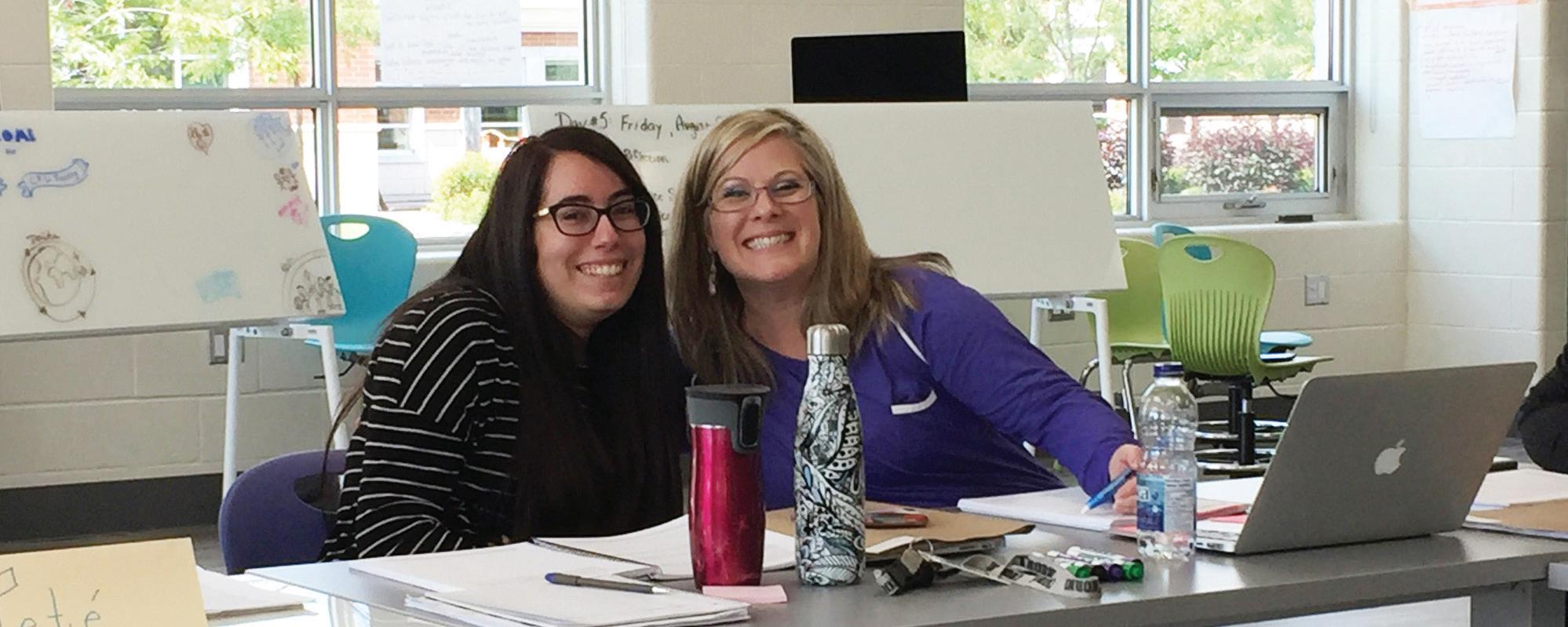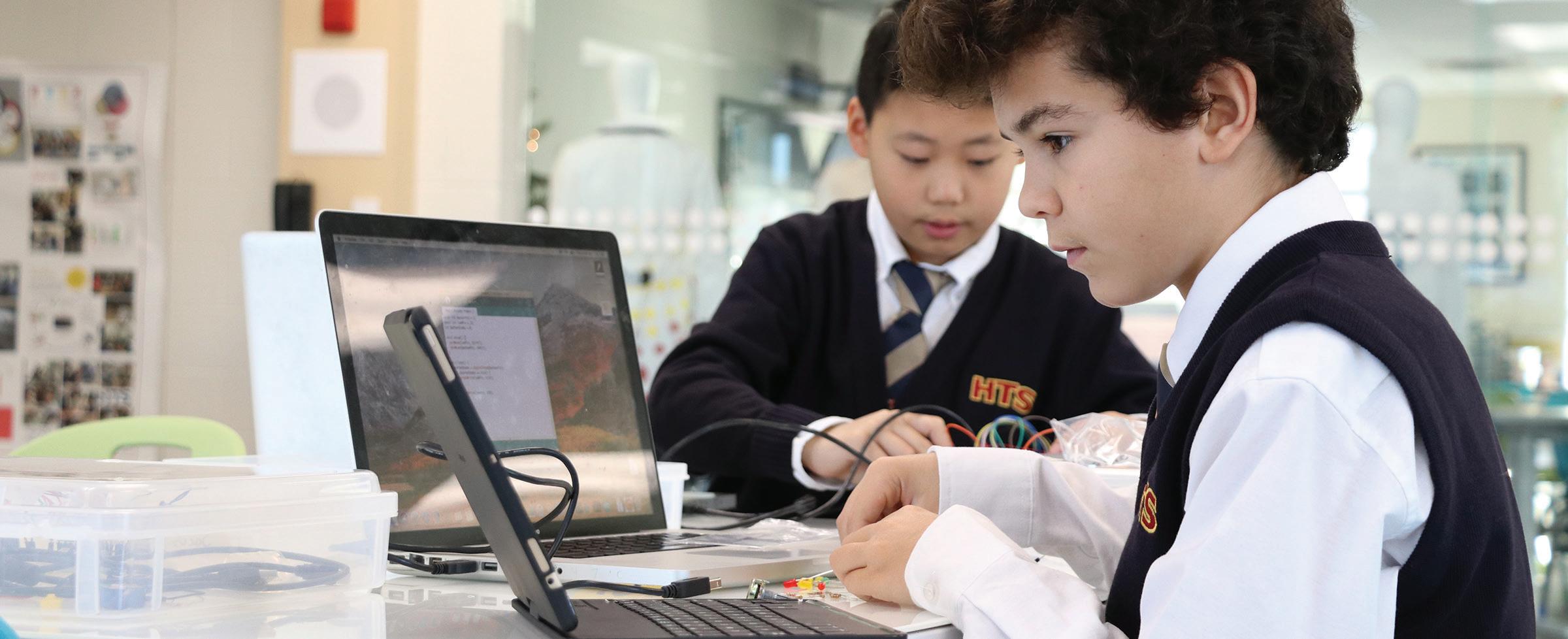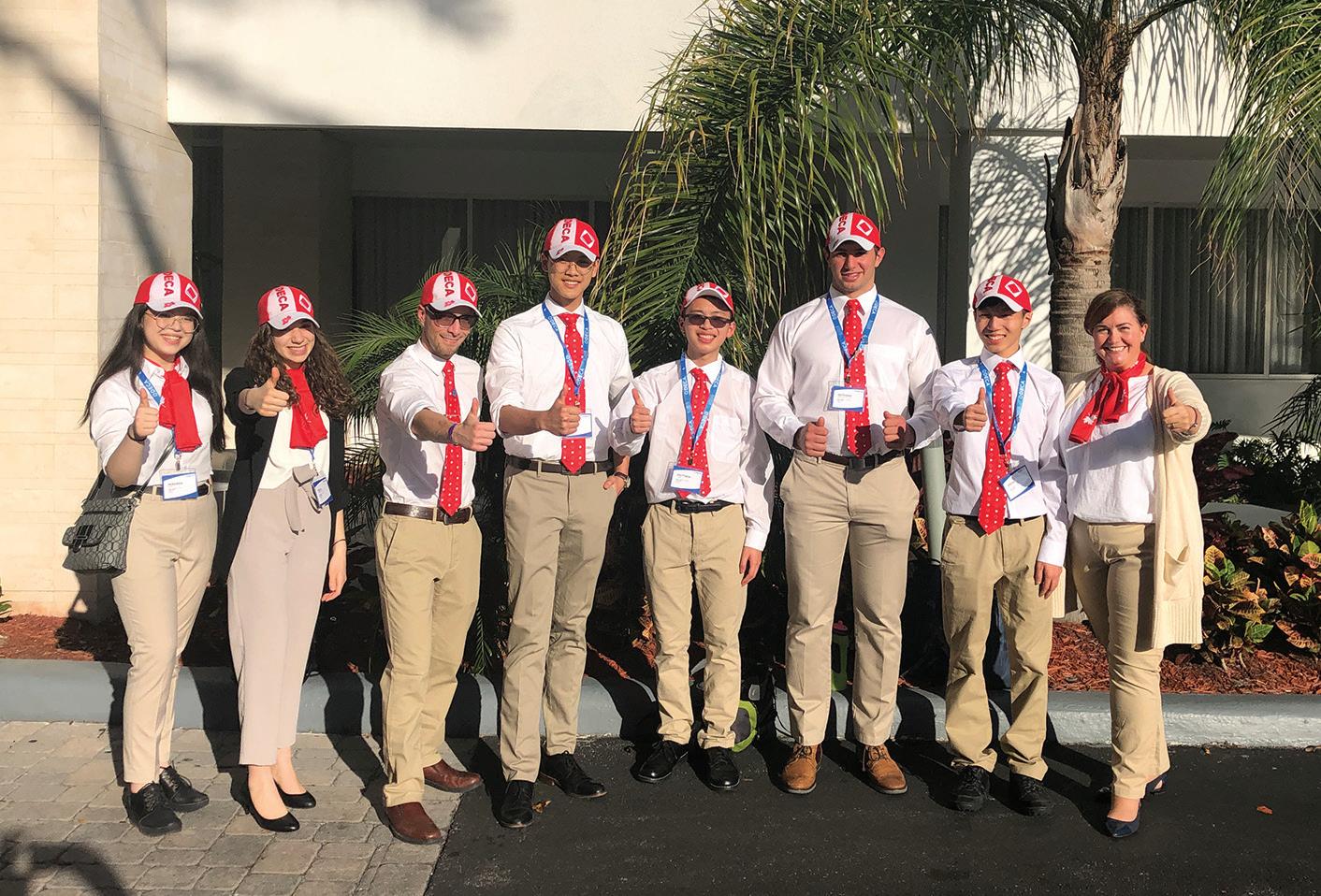
9 minute read
A Student’s Perspective
BY DEMI PALLAS, GRADE 12 STUDENT AND HEAD PREFECT
After being approached by her Head of School, Helen Pereira-Raso, Head Prefect Demi Pallas crafted a message to deliver to the attendees of the second annual HTS Assessment Summit. A few weeks later, Demi delivered the same moving speech to 120+ HTS staff members during their Professional Development Day in October. This is an excerpt of her speech.
Behind every test is a story, and sometimes the story looks like this: You’re pacing up and down the halls in your room, reciting, and repeating, and reciting and repeating lists of key information to remember. You spend the hour before the test copying down formulas on a piece of paper, just so you can write them on the back of the test as soon as you get it. You stay up late much of the night before the test, trying to cram everything into your head.
This situation is too real for so many students, especially when preparing for assessments, but this shouldn’t be the way we learn. Short-term retention and regurgitation of knowledge shouldn’t be the way learning is assessed. Assessment should reflect understanding, not memorization. Learners must be able to explore their passions, expand the horizons of what qualifies as a typical assessment and establish a healthy mindset around stress and grades.
When I think about projects that I remember well, I think back to my Grade 7 French class. To learn the different verbs and adjectives, we were handed zero worksheets, and we didn’t have a test. What our teacher had us do instead was invent our own way to learn the material and present it in class. My friends and I were so excited, because we had the perfect idea – we were going to star in a music video… about French verbs! As silly as it sounds, I still remember those irregular verb conjugations from the song and video we made. In this project and many more in that class, I had the opportunity to express my passions, and turn it in for marks! I love performing, so I was thrilled. Every group in the class turned in a different form of learning, and we all learned the material. Students retain what they can truly connect with. And what they are able to connect with is very often things that they are passionate about. In Middle School, I started a band that practised after school, and one of our band’s pieces got used as a test piece for our music class. In my Grade 11 biology class, I made a 30-minute CSI-style movie as an end-of-year project to connect the units of genetics, animal systems and biodiversity. Truly, I feel very lucky to be at this school. I could tell countless stories about projects, assignments and tests that have meant so much to me. An assessment could be just a test, or it could be something more – it has the capacity to shape not only what a student learns but how a student learns, and it can spark a lifelong passion. The mindsets students have around assessments are shaped by how every test, quiz and project goes.

Slide from Demi's speech demonstrating steps to find a solution to assessment.
Evolving the possibilities of what an assessment can look like is vital too. In 30 years, students won’t learn how they learn now, thanks to innovations not yet even conceived. Progress is inevitable and beyond our perceptions. Change to the classroom is happening at an exponential rate. It’s thought that in 10 years, new technology will be arriving faster than our ability to comprehend its effects. It really is challenging to stay up-to-date on all the new innovations, trends and methods students are using.
In our social sciences classes, we use a “questions chart” when exploring a new topic. One colour is used to indicate the “factual” questions, the questions with answers that students today have easy access to. Students are always going to have a calculator on their person, and they are always going to be able to tell you that the capital of Hungary is Budapest. Going into life, they have this information literally in their pocket, just a smartphone search away. So it makes sense that assessment should focus somewhere beyond, on questions of other colours. “What could…? How might…? Why would…?” These are the kinds of questions we need to be striving to ask and assess. When students develop and reinforce these skills through assessment, that’s what gives them a leg up in life. For example, here at Holy Trinity School, the Fashion Forward club and art students could be assessed on what they see as visions for fashion in the future. In learning through these questions, students use the innovation labs to imagine how the world could be.
Imagine kids in one class coding a game to test kids in a younger class. Imagine students teaching to the class about molecular chemistry through their passion for cooking. Working with each class and school to craft uniquely specialized assessments is what truly unlocks a group’s potential. Through these kinds of experiences, a classroom can evolve to reflect the group it serves. It’s a risk to change a well-established system. It’s a risk to turn away from a lesson plan mapped out years ago. It’s a risk and an effort – but an effort that makes such a difference and is so appreciated. When students feel free to explore the topic through angles that interest them, and through teaching each other, the impact is immeasurable.
Regardless of the results they achieve, students generally feel a certain pressure to attain a high academic average. A study published in 2017 found that there was a 33 per cent spike in two types of perfectionism among college students in Canada, the US and the UK: “self-oriented,” or having high expectations of yourself, and “other-oriented,” where you have rigorous standards for others. While the grade system is beneficial as a way to track progress and understanding, it’s the relationship that teens have with the system that is troubling. Grades are all too often the topic of unhealthy conversations that lead to feelings of self-doubt. When students hear that their friends performed “better” than they did on a test, no matter the progress they might have made, they feel bad. This culture of valuing and comparing marks exists between students in person and online, and students often underestimate how it makes their peers feel. Feeling like you need to do better leads to pushing too hard. It’s a pressure I know all too well. An example of this happened last year – in the same week, I had a math test, then a physics test and then a chemistry test, all one day after another. I studied so hard. I opted out of performing at a school concert I would usually attend, I stayed home from my brother’s birthday dinner, and I didn’t go to my friend’s party. I aced every test that week – so in my mind, I had achieved success. This is the first problem with the typical unit assessment as it relates to stress. Within student conversations, the idea is still that success is a high grade. This is further reinforced when students achieving these grades are rewarded by parents, siblings and teachers.

Slide from Demi's speech initiating the change needed in the mindset of students.
A high mark on a test is a success. However, success is not only the high mark. Success is all the practice, progress, learning and growth the student made along the way. To understand this model of success, here’s an analogy. Imagine you and your friend climb a mountain, and the next day the newspaper headline congratulates your friend – she got all the way to the top of the mountain! Your friend shows you the article, and your heart sinks. You might think, “Oh… but I climbed the mountain too! I climbed so many steps, but I guess it wasn’t good enough.” The truth is that you had success here too – but with conversations focused on the percentage grading system, maybe you weren’t celebrated for your progress and accomplishments. When students achieve lower grades on assessments, it leads to discouragement. Their enthusiasm for learning goes down when they feel like the work they did is not of value, even when so often it is. It’s vital that teachers value process work too. Comparing grades starts young, and this can lead to unhealthy competition and perfectionism later in life. So another model of success can be formed, where teachers, parents and students alike honour each student for his or her progress. The grades system is not the problem. What is the problem is the conversations and mindsets that it shapes. As the HTS community, we must work towards this new success model.
After my week of tests, I remember feeling this incredible pride, and every time I faced another lineup of assessments, I remembered how I had worked so hard that week. To motivate myself, I thought, “If I could do so well then, I could do it again.” Towards the end of the year though, I found myself in a similar situation with tests lined up day after day. But I couldn’t perform as I did before. I tried to convince myself that I could study as hard as I had that one week, but I was under even more pressure now and getting less sleep. A simple “Are you okay?” from a friend ended up with me in tears. I was pushing myself too hard. For the first time that week, I paused to reflect and thought, “This can’t be how I define success anymore. This cannot be what I expect of myself.”
There’s an integral quote from the story The Little Prince by Antoine de Saint-Exupéry: “It is only with the heart that one can see rightly; what is essential is invisible to the eye.” To me, this applies to everything. As students, it’s not the results we can see or the marks we get that make us who we are. That’s a message we hear frequently, but it’s not one that has really sunk into the subconscious of the students of this generation yet. Each educator has the opportunity to make us believe that. Each educator has the power to change lives. It’s the greatest power there is. It takes work to commit to a better future, and Holy Trinity School is working towards it every day. It’s a future where students can be assessed through their passions, through creative outlets and through ways that honour their journey, not just the destination. In this future, students have a healthier relationship with stress and seeking help, and they have a stronger connection to the material they learn. It takes dedication, failures, setbacks, time and love. Teachers, know that the impact of your hard work is so valued by the students. Truly, we are so grateful to have you in our lives. While the real effects you have on us may be invisible to the eye, they are never invisible to the heart.






